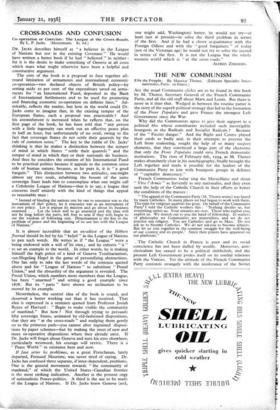CROSS-ROADS AND CONFUSION
Da. JAC.RS describes himself as " a believer in the League of Nations but not in the existing Covenant." Tie would have written a better book if he had " believed " in neither : for it is the desire to make something of Geneva at all costs which mars what might otherwise have been a helpful and constructive argument.
The core of the book is a proposal to fuse together all- round limitation of armaments and international economic co-operation—two declared objects of British policy—by setting aside to per- cent. of the expenditure saved on arma- ments for " an International Fund, deposited in the Bank of International Settlements and to be used for promoting and financing economic co-operation on definite lines." Ad- mirable, reflects the reader, but how in the world could Dr. Jacks come, to_ imagine .that, in the existing temper of the European States, such a proposal was practicable ? And his astonishment is increased when he reflects that, on the first page of the book, he has been told that " any person with a little ingenuity can work out an effective peace plan in half an hour, but unfortunately of .no avail, owing to the fact that sovereign States do not settle their quarrels by the rule of common sense." The key to the riddle of Dr. Jacks' thinking is that he makes a distinction between the temper of mind in which States " settle their quarrels " and the temper of mind in which they or their nationals do business. And thus he considers the creation of his International Fund to be practical politics because it appeals to the common sense side of human nature, because, as he puts it, it is " a good bargain." This distinction between two attitudes, one might almost say two souls, inhabiting the bosom of the same sovereign State leads him to contemplate what one might call a Cobdenite League of Nations—that is to say, a league that concerns itself entirely with the kind of things that appeal to reasonable men : " Instead of Binding the nations one by one to renounce war as the instrument of their policy, let it renounce war as an instrument of its own policy. Let it pursue its mission and go about its business unarmed . . . Let .the whole will to go unarmed and the time will not be long before the parts, left free to arm if they will, begin to see the wisdom of following suit. Disarmament is the key to the problem of peace and the beginning of its use lies with the League of Nations. , It is almost' incredible that an ex-editor of the Hibbert Journal should be led by his " belief " in the League of Nations to pen such words. He writes as if " the League " .were a being endowed with a will orits- own.; and he exhorts " it " to set an example to the world. ,In other words, he is making himself the high priest of a kind of Geneva Totalitarianism, out-Hegeling Hegel in the game of personifying abstractions. One has only to take the last words of the sentence quoted above and for " League of Nations " to substitute " Postal Union," and the absurdity of the argument is revealed.. The Postal Union, which numbers more members than the League, has been " unarmed " and setting a good example since 1878. But its " parts " have shown no inclination to be moved by its example.
Nevertheless, the central- idea of the book is sound, and deserved a better working out than it has received. That idea is expressed in a sentence quoted from Professor Josiah Royce of Harvard : " Begin to make visible the community of mankind." But how ? Not through trying to persuade fifty sovereign States, animated by old-fashioned dispositions, that they are " at the cross-roads " and nudging them gently on to the primrose path—you cannot alter ingrained disposi- tions by paper schemes—but by making the most of new and more co-operative. dispositions where they already. exist. If Dr. Jacks will forget about Geneva and turn his eyes elsewhere, particularly westward, his courage will revive. There is a " Peace. World ". in existence here and now.
Il faut serier les problimes, as a great Frenchman, lately departed, Fernand Maurette, was never tired of saying. Dr. Jacks has confused three separate, if inter-dependent, problems. One is the general movement towards " the community of mankind," of which the United States-Canadian frontier is the most striking indication. Another is the present orgy of nationalistic Power-politics. A third is the use to be made of the League of Nations. If Dr. jacks knew Geneva (and,
one might add, Washington) better, he would not try—at least just at present—to solve the third problem in terms of the first. And if he had a closer acquaintance with the Foreign Offices and with the " good bargainers " of today (not of the Victorian age) he would not try to solve the second in terms of the first. It is not the League but the whole western world which is " at the cross-roads."
ALFRED ZIM2tERN.














































 Previous page
Previous page